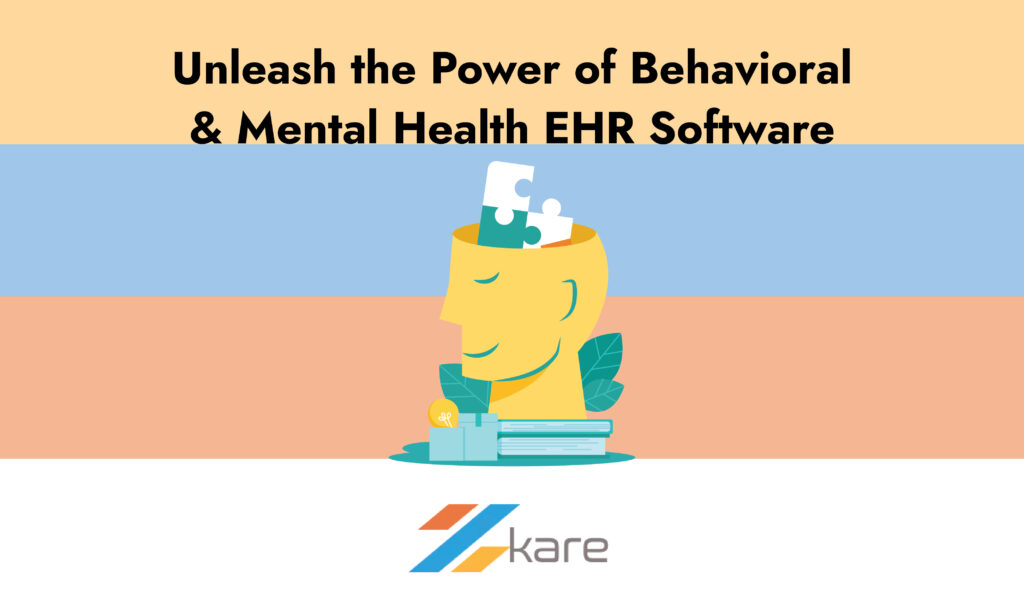
Behavioral Health, Mental health EHR
Do you want to avoid sorting through piles of paper records and need help remembering every detail about your client’s health? Do you want to streamline your practice and raise the quality of the service you offer? If so, it could be time to unleash the potential of EHR software for behavioral and mental health practices.
Electronic Health Records (EHR) software has reformed the healthcare sector by providing a centralized platform for storing, handling, and sharing patient data.
Traditional EHR systems would need help to gather the complex information and specialized needs of behavioral and mental health practices. To address this issue, mental health and behavioral EHR software was designed to meet the specific requirements of therapists, psychiatrists, psychologists, and other mental health practitioners. In this blog, let’s delve deeper into the full potential of this specialized EHR software.
How behavioral & mental health EHR enhances quality care for providers
Electronic Health Records (EHRs) are essential in improving quality care in behavioral and mental health practices. Here are some ways:
Improved Patient Information Sharing: EHRs allow medical professionals to securely and effectively share clients’ information, such as medical histories, diagnoses, treatment plans, and test results. It assists providers in collaborating and making well-informed decisions about a client’s treatment.
Better Care Coordination: EHRs facilitate care coordination between various clinicians, particularly for clients with complex medical conditions. For instance, a behavioral health provider can share information about a client’s treatment plan and adjust the treatment regimen accordingly.
Increased Accessibility: EHRs allow authorized healthcare professionals to access patient data from any location with an internet connection. It is beneficial for behavioral and mental health care, where clients might see various providers in numerous locations.
Enhanced communication: EHRs come with tools like encrypted messaging and electronic prescriptions, which can speed up and improve the accuracy of information exchange by streamlining the communication between providers.
Enhancing Patient Engagement: EHRs also include patient portals, which enable clients to access their health data, interact with their providers, and monitor their progress. This can increase client involvement and result in better health outcomes.
Choosing Your behavioral and mental health solution:
The mental health practitioner should understand personalized behavioral health systems’ unique requirements. A comprehensive understanding of the development needs will guarantee that the software for behavioral health specialists can fill the gap, medically and financially. This understanding should be based on different criteria:
- Clinicians needs
- Client goals
- Current challenges
- System preferences
- Management requirement
Significant trends in EHR that will shape the future of behavioral & mental health practices
The following trends in behavioral and mental health EHR are likely to have an impact on how the industry expands in the future:
- Telehealth: With the rising use of telehealth technology, clients will get more access to mental health services from anywhere.
- Focus on Prevention and Wellness: Preventative care and wellness in mental health will receive more attention, emphasizing early intervention and decreasing the risk of mental health conditions.
- Growth of Community-Based Care: Community-based care, like outreach programs and peer support groups, will become more relevant as a way to offer mental health services in an accessible and supportive environment.
- Integration with Physical Health Care: Behavioral and mental health is increasingly integrated into the overall health care system, with a more comprehensive approach to quality patient care.
Final thoughts
In conclusion, integrating behavioral and mental health EHR software in the healthcare industry can revolutionize how mental health is approached, treated and monitored with features such as easy appointment scheduling, secure client data management, and streamlined communication between healthcare providers and clients. These solutions are assisting in overcoming barriers and expanding access to high-quality mental health care. To learn more and get a demo of the ZKare mental health management software.